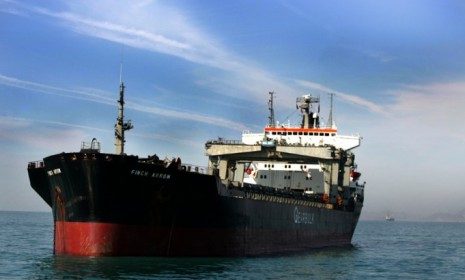Will Europe's Iranian oil embargo backfire?
The EU's vow to stop buying millions of barrels of oil a day from Tehran could have a devastating effect on Iran's economy

A free daily email with the biggest news stories of the day – and the best features from TheWeek.com
You are now subscribed
Your newsletter sign-up was successful
Taking a cue from the U.S., the European Union is trying to force Tehran to rein in its nuclear program by imposing damaging new sanctions on Iran, banning imports of Tehran's cash cow, oil. Iran, the world's third largest oil exporter, reacted angrily, renewing a threat to block all oil tankers from leaving the Persian Gulf by closing the Strait of Hormuz. Russia also warned that the new sanctions could be counterproductive, since an alienated Tehran might be less willing to cooperate with coming inspections by the International Atomic Energy Authority. Will the new sanctions really backfire?
These sanctions could help Iran's leaders: "While this might seem like a good way to way to stall Iran's nuclear ambitions," says Matthew Feeney at The American Conservative, these "foolish" sanctions, like past ones, will be ineffective. Either Iran will find new buyers for its oil, or its "already suffering" economy will collapse. And if Iran's leaders successfully blame the West for cratering the country's domestic economy, they would effectively silence Iran's oppressed political opposition and "unite the country behind the regime the sanctions are aiming to harm."
The Week
Escape your echo chamber. Get the facts behind the news, plus analysis from multiple perspectives.

Sign up for The Week's Free Newsletters
From our morning news briefing to a weekly Good News Newsletter, get the best of The Week delivered directly to your inbox.
From our morning news briefing to a weekly Good News Newsletter, get the best of The Week delivered directly to your inbox.
Or they might encourage Iranians to demand reform: "The embargo matters because of the scale of the relationship," says Ian Black at Britain's Guardian. Europe buys 20 percent of Iran's oil (2.6 million barrels a day), and cutting that off could devastate an economy already "suffering badly from rising unemployment and inflation." The political impact is anybody's guess: Yes, it could rally Iranians behind the regime. But remember, the Arab Spring just proved that autocratic states can be undone by "anger fueled by economic hardship." That could happen in Iran, too.
"The Iran oil embargo carries an uncertain cargo to Tehran"
Whatever happens, this is undeniably a risky move: Iran's angry threats are driving up oil prices, says Steve Rattner at CNN, and they'll "go a lot higher if Iranian oil is out of the picture." The world barely has enough spare capacity to replace the 2.8 million barrels Iran produces daily. So the U.S. and Europe will "have to thread the needle" to get results without sparking a global energy crisis. The fact that they're even trying such a risky move "just shows how scared people are about the nuclear side of Iran."
"Will Iran finally change course?"
A free daily email with the biggest news stories of the day – and the best features from TheWeek.com
Actually, the sanctions might have little effect: There's a chance "the EU's advertised toughness is less than meets the eye," says Robert Marquand in The Christian Science Monitor. The EU is banning new contracts, but Iran can keep exporting under old deals for another six months. That's plenty of time for Iran figure out how to soften the blow, or for Europe to ease the pressure if the embargo is doing too much harm to EU economies, "particularly beleaguered Greece, which takes 30 percent of its oil from Iran."
-
 Local elections 2026: where are they and who is expected to win?
Local elections 2026: where are they and who is expected to win?The Explainer Labour is braced for heavy losses and U-turn on postponing some council elections hasn’t helped the party’s prospects
-
 6 of the world’s most accessible destinations
6 of the world’s most accessible destinationsThe Week Recommends Experience all of Berlin, Singapore and Sydney
-
 How the FCC’s ‘equal time’ rule works
How the FCC’s ‘equal time’ rule worksIn the Spotlight The law is at the heart of the Colbert-CBS conflict